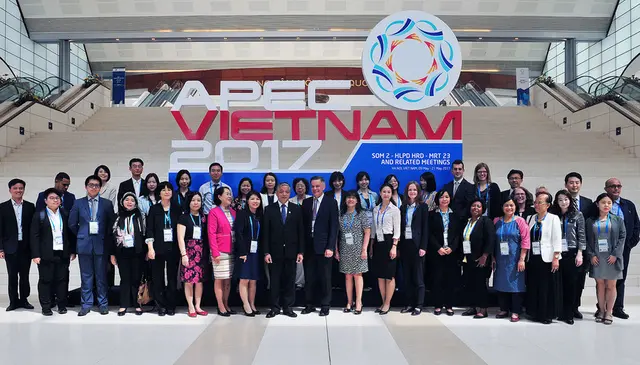A two-day gathering of trade officials from the 21 Asia-Pacific Economic Cooperation (APEC) members concluded in Hanoi, Vietnam on Sunday, producing an agreement based on five major principles enshrining regional economic integration.
According to Chinese Vice Minister of Commerce Wang Shouwen, the five principles included: deepening regional economic integration and promoting the Asia-Pacific free trade area; supporting multilateral trade; establishing pathways to more sustainable, innovative and inclusive growth; enhancing trade interconnection, and strengthening small businesses’ competitiveness and innovation; and putting APEC's post-2020 vision on the agenda.
Wang also expressed China's commitment to supporting a global multilateral trade system and making joint efforts with other APEC members to prevent protectionism and reduce trade risks, Xinhua reported.
According to the Chinese news agency, Chinese Minister of Commerce Zhong Shan emphasized at the meeting that the realization of inclusive, sustainable and innovative growth is the common goal of APEC economies.
The backdrop to the meeting was the US anti-globalization agenda under Donald Trump contrasted against the pro-international trade policies of other major economies including China. China has been widely recognized as becoming the new leader of global trade with its Belt and Road Initiative.
"APEC's concept of open and inclusive regional cooperation fully corresponds with the spirit of China's Belt and Road Initiative," said Zhong.
Chinese minister meets with new US trade rep
China's Commerce Minister Zhong Shan (R) attends the Asia-Pacific Economic Cooperation (APEC) 23rd Ministers Responsible for Trade Meeting at the National Convention Center in Hanoi on May 20, 2017.
Zhong also held talks with new US Trade Representative Robert Lighthizer on the sidelines of the meeting on Saturday afternoon.
China and the US are important trade and investment partners, and economic cooperation is the "ballast stone" of bilateral relations, Xinhua quoted Zhong saying.
Lighthizer reportedly replied that a trade war is not in the interests of either China or the US, and that the Trump administration is prepared to work with China tackle the problems in bilateral economic and trade relations.
'No way back' for US quitting TPP
How to proceed after the United States’ withdrawal from the Trans-Pacific Partnership (TPP) was a major question at the meeting.
The 11 remaining signatories to the TPP met on the sidelines of the weekend event, partly in the hope of persuading Washington to reconsider.
But Lighthizer said there was “no way back” and expressed hope that the countries in the region could instead sign a series of bilateral trade agreements with each other.
(CGTN)
 简体中文
简体中文

